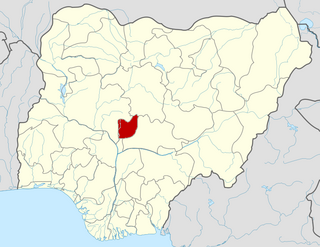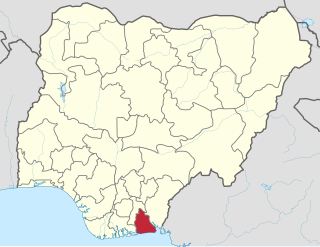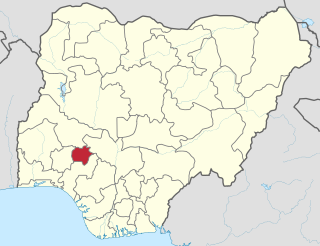 W
WNigeria is a federation of 36 states and 1 Federal Capital Territory. Each of the 36 states is a semi-autonomous political unit that shares powers with the Federal Government as enumerated under the Constitution of the Federal Republic of Nigeria. The Federal Capital Territory, also known as FCT, is the capital of Nigeria and located in the city of Abuja. FCT is not a state but is administered by elected officials who are supervised by the Federal Government. Each state is sub-divided into Local Government Areas (LGAs). There are currently a total of 774 Local Government Areas in Nigeria. Under the Constitution, the 36 states are co-equal but not supreme because sovereignty resides with the Federal Government. The constitution can be amended by the National Assembly, but each amendment must be ratified by two-thirds of the 36 states of the federation.
 W
WThe Federal Capital Territory, commonly known as FCT, or loosely as FCT-Abuja, is a federal territory in central Nigeria. Abuja, the capital city of Nigeria, is located in this territory. FCT was formed in 1976 from parts of the states of old Kwara, Niger, Kaduna and Plateau States with the bulk of landmass carved out of Niger State. It is within the Middle Belt region of the country. Unlike the States of Nigeria, which are headed by elected Governors, it is administered by the Federal Capital Territory Administration, headed by a minister appointed by the President.
 W
WAbia is a state in the south eastern part of Nigeria. The capital is Umuahia, and the major commercial city is Aba, which was formerly a British colonial government outpost in the region, and is also one of the most populated areas in Nigeria. Abia state was created in 1991 from part of Imo State. It is one of the constituent states of the Niger Delta region. It's also the 5th most industrialized state in the country, and has the 4th highest index of human development in the country, with numerous economic activities and fast growing populations as recorded by the United nations early 2018. The state also houses the biggest cattle market in Nigeria.
 W
WAdamawa is a state in northeastern Nigeria, whose capital and largest city is Yola. In 1991, when Taraba State was carved out from Gongola State, the geographical entity Gongola State was renamed Adamawa State, with four administrative divisions: Adamawa, Michika, Ganye, Mubi and Numan. It is the home of the American University of Nigeria in Yola, Modibbo Adama University of Technology Yola, Adamawa State Polytechnic, Yola and Adamawa State college of Nursing and Midwifery. It is one of the thirty-six states that constitute the Federal Republic of Nigeria.
 W
WAkwa Ibom is a state in Nigeria. It is located in the coastal southern part of the country, lying between latitudes 4°32′N and 5°33′N, and longitudes 7°25′E and 8°25′E. The state is located in the South-South geopolitical zone, and is bordered on the east by Cross River State, on the west by Rivers State and Abia State, and on the south by the Atlantic Ocean and the southernmost tip of Cross River State.
 W
WAnambra is a state in southeastern part of Nigeria. The capital and seat of government is Awka. Onitsha, a historic port city from pre-colonial times is the largest urban area in the state. The state's theme is "Light of the Nation", formerly known as the " Home for all". Anambra has 181 towns within it.
 W
WBauchi State takes its name from the historic town of Bauchi, which also serves as the capital city and is located in the North East of Nigeria. The state was formed in 1976 when the former North-Eastern State was broken up. It originally included the area now in Gombe State, which became a distinct state in 1996.
 W
WBayelsa is the southernmost state in Nigeria in the core Niger Delta region, between Delta State and Rivers State. Its capital is Yenagoa. The main language spoken is Ijaw with dialects such as Kolukuma, Mein, Bomu, Nembe, Epie-Atisa, and Ogbia. Like the rest of Nigeria, English is the official language. The state was formed in 1996 from part of Rivers State and is thus one of the newest states of the Nigerian federation.
 W
WBenue State is one of the Middle Belt states in Nigeria with a population of about 4,253,641 in 2006 census. It is inhabited predominantly by the Tiv, Idoma and Igede peoples, who speak Tiv, Idoma, and Igede languages respectively. Its capital is Makurdi. Benue is a rich agricultural region; popularly grown crops includes; oranges, mangoes, sweet potatoes, cassava, soya bean, guinea corn, flax, yams, sesame, rice, groundnuts, and Palm Tree. Benue State as it exists today is a surviving legacy of an administrative entity which was carved out of the protectorate of northern Nigeria at the beginning of the twentieth century. The territory was initially known as Munshi Province until 1918 when the name of its dominant geographical feature, the 'Benue River' was adopted.
 W
WBorno, also known as Borno State, is a state in north-eastern Nigeria. Its capital and largest city is Maiduguri. The state was formed in 1976 from the split of the North-Eastern State. Until 1991 it contained what is now Yobe State. The motto or slogan of the state is "Home of Peace". Borno is the homeland of the Kanuri people in Nigeria and several other ethnic groups.
 W
WCross River is a state in South South Nigeria, bordering Cameroon to the east. Its capital is Calabar and its name is derived from the Cross River (Oyono), which passes through the state. English and French are the major foreign languages of the state while Bekwarra, Bette, Ejagham and Efik are major indigenous languages of this state. Ejagham remains the largest ethnic group which stretches from the northern senatorial district to the southern senatorial district.
 W
WDelta State is an oil and agricultural producing state in Nigeria. It is situated in the region known as the South-South geo-political zone with a population of 4,112,445. The capital city is Asaba, located at the northern end of the state, with an estimated area of 762 square kilometres (294 sq mi), while Warri is the economic nerve center of the state and also the most populated. It is located in the southern end of the state. The state has a total land area of 16,842 square kilometres (6,503 sq mi).
 W
WEbonyi State is in southeastern Nigeria. It is inhabited and populated primarily by the Igbo with the city of Abakaliki as its capital and largest city. Other major townships include Afikpo, Onueke, Ezzamgbo, Edda, Effium, Aba Omege, Amasiri, Unwana, Echara Ikwo, Egu-Ubia, Ụbụrụ, Onicha, etc. It was one of the six states created in 1996 by the then federal military government of General Sani Abacha. The State of Ebonyi was created from parts of both Enugu State and Abia State, which were the Abakaliki division from Enugu State and the Afikpo division from Abia State respectively. It has three senatorial zones, the Abakaliki division make up Ebonyi North and Ebonyi Central senatorial zones, while the Afikpo division make up the Ebonyi South senatorial zone. Ebonyi has thirteen local government areas as well as local development centres created by the state government. It is home to six prominent higher institutions of learning: Ebonyi State University, Abakaliki (EBSU); Alex Ekwueme Federal University Ndufu Alike Ikwo ; Akanu Ibiam Federal Polytechnic, Unwana; Federal College of Agriculture, Ishiagu; Ebonyi State College of Education Ikwo (EBSCOEI) and College of Health Sciences, Ezzamgbo.
 W
WEdo State is a state in Southern Nigeria. Its capital is Benin City. The 2014 estimated population of the Edo state is 5 million people. It is made up of 4 major ethnic groups; namely the Bini, Esan, Owan, and Etsako. However the State has a high presence of residents from across the country and the world because of its cosmopolitan tendencies. Benin City the capital has a history of being one of the foremost destinations of Europeans during their exploration of the African continent many centuries ago. Some of the flash points have remained tourists attractions for the state.
 W
WEkiti State is in Southwest region of Nigeria, declared a state on 1 October 1996 alongside five other states in the country by the then military government under head of state, General Sani Abacha. As one of the newest states of the Nigerian federation, it was carved out of the territory of old Ondo State, and covers the former 12 local government areas that made up the Ekiti Zone of old Ondo State. On creation, it had 16 Local Government Areas (LGAs), having had an additional four carved out of the old ones. Ekiti State is one of the 36 states that constitute Nigeria.
 W
WEnugu, usually referred to as Enugu State to distinguish it from the city of Enugu, is a state in southeastern Nigeria, created in 1991 from part of the old Anambra State. Its capital and largest city is Enugu, from which the state derives its name. The principal cities in the state are Enugu, Ohum, Ezeagu, Ngwo, Nsukka, Agbani, Awgu, Aninri and Udi.
 W
WGombe, usually referred to as Gombe State to distinguish it from its capital city Gombe, is located in northeastern Nigeria and is one of the country's 36 states. The boundaries of the state roughly correspond to those of the Tangale-Waja Chiefdom and Gombe Emirate, a traditional state. The state is inhabited by the dominant Fulani tribe.
 W
WImo is one of the 36 States of Nigeria and is in the south east region of Nigeria. Owerri is its capital and among the largest towns in the state. Its other notable towns are Orlu, Obowo, Oguta, Mbaise and Okigwe. Located in the south-eastern region of Nigeria, it occupies the area between the lower River Niger and the upper and middle Imo River.
 W
WJigawa is a state in northwestern Nigeria. Its capital is Dutse.
 W
WKaduna State is the 18th state of Federal Republic of Nigeria located in the northwest zone of the country. It takes its name for the capital of Kaduna, hence it is usually referred to as Kaduna State to distinguish the two. It is ranked 4th by land area and 3rd by population in Nigeria. The state capital was the former capital city of the British protectorate of Northern Nigeria region (1923–1966) after Zungeru (1903–1923) and Lokoja (1897–1903). Other major urban areas include Zaria, Kagoro, Kafanchan, Kachia, Nok, Makarfi, Birnin Gwari and Zonkwa.
 W
WKano State is a state located in northern Nigeria. Kano was created on May 27, 1967 from part of the Northern Region, and borders Katsina State to the northwest, Jigawa State to the northeast, Bauchi State to the southeast and Kaduna State to the southwest. The state's capital is the city of Kano.
 W
WKatsina, usually referred to as Katsina State to distinguish it from the city of Katsina, is a state in North West zone of Nigeria. Its capital is Katsina, and its Governor is Aminu Bello Masari, a member of the All Progressives Congress. Katsina State was brought out of old Kaduna State in 1987.
 W
WKebbi is a state in north-western Nigeria with its capital at Birnin Kebbi. The state was created out of a part of Sokoto State in 1991. Kebbi State is bordered by Sokoto State, Niger State, Zamfara State, Dosso Region in the Republic of Niger and the nation of Benin. It has a total area of 36,800 km2 (14,200 sq mi).
 W
WKogi, is a state in the central region (Middle-Belt) of Nigeria. It is popularly called the Confluence State because of the confluence of River Niger and River Benue at its capital, Lokoja, which is the first administrative capital of modern-day Nigeria.
 W
WKwara is a state in Western Nigeria. Its capital is Ilorin. Kwara is located within the North Central geopolitical zone. The primary ethnic group is Yoruba, with significant Nupe, Bariba, and Fulani minorities.
 W
WLagos, sometimes referred to as Lagos State to distinguish it from Lagos Metropolitan Area, is a state located in southwestern Nigeria. The smallest in area of Nigeria's 36 states, Lagos State is arguably the most economically important state of the country, containing Lagos, the nation's largest urban area. It is a major financial centre and would be the fifth largest economy in Africa, if it were a country.
 W
WNasarawa is a state in north central zone of Nigeria. Its capital is Lafia.
 W
WNiger is a state in the Middle Belt region of Nigeria and the largest state in the country. The state's capital is at Minna. Other major cities are Bida, Kontagora and Suleja. It was formed in 1976 when the then North-Western State was bifurcated into Niger State and Sokoto State. It is home to Ibrahim Babangida and Abdulsalami Abubakar, two of Nigeria's former military rulers. The Nupe, Gbagyi, Kamuku, Kambari, Hun-Saare, Hausa and Koro form the majority of numerous indigenous tribes of Niger State.
 W
WOgun State is a state in southwestern Nigeria. Created in 1976, it borders Lagos State to the south, Oyo and Osun states to the north, Ondo to the east and the Republic of Benin to the west. Abeokuta is the capital and largest city in the state. The state's appellation is "Gateway to Nigeria". It was created in February 1976 from the former Western State. The 2006 census recorded a total population of 3,751,140 residents.
 W
WOndo or Ondo State is a state in Nigeria created on February 3, 1976, from the former Western State. It originally included the present Ekiti State, which was split off in 1996. Akure is the state capital. Each Nigerian state has several ministerial offices representing the federal government. Ondo State. Ondo state borders: Ekiti State to the north, Kogi State to the northeast, Edo State to the east, Delta State to the southeast, Ogun State to the southwest, and Osun State to the northwest and Atlantic Ocean to the south.
 W
WOsun is an inland state in south-western Nigeria. Its capital is Osogbo. It is bounded in the north by Kwara State, in the east partly by Ekiti State and partly by Ondo State, in the south by Ogun State and in the west by Oyo State. The state's current governor is Adegboyega Oyetola, who was declared winner of the September 2018 governorship elections. He was declared winner of the 27 September 2018 rerun elections after the initial 22 September 2018 gubernatorial election was declared inconclusive by the Independent National Electoral Commission. Osun is home to several of Nigeria's most famous landmarks, including the campus of Obafemi Awolowo University, one of Nigeria's pre-eminent institutions of higher learning. The university is also located in the ancient town of Ile-Ifẹ, an important early center of political and religious development for Yoruba culture. Other important cities and towns include the ancient kingdom-capitals of Oke-Ila Orangun, Iragbiji, Ikirun, Ila Orangun, Ijebu-Jesa, Ede, Iwo, Ejigbo, Ibokun, Ode-Omu, Ifetedo, Esa-Oke, Ilesa, Okuku, and Igbajo.
 W
WOyo, usually referred to as Oyo State to distinguish it from the city of Oyo, is an inland state in south-western Nigeria, with its capital at Ibadan. It is bounded in the north by Kwara State, in the east by Osun State, in the south by Ogun State and in the west partly by Ogun State and partly by the Republic of Benin.
 W
WPlateau is the twelfth-largest state in Nigeria. Approximately in the centre of the country, it is geographically unique in Nigeria due to its boundaries of elevated hills surrounding the Jos Plateau its capital, and the entire plateau itself.
 W
WRivers State, also known simply as Rivers, is one of the 36 states of Nigeria. According to census data released in 2006, the state has a population of 5,198,716, making it the sixth-most populous state in the country. Its capital and largest city, Port Harcourt, is economically significant as the centre of Nigeria's oil industry. Rivers State is bounded on the South by the Atlantic Ocean, to the North by Imo, Abia and Anambra States, to the East by Akwa Ibom State, and to the West by Bayelsa and Delta states. It is home of many ethnic groups: Ijaw Subgroups, Ikwerre, Ekpeye, Etche etc subgroups of the Igbo people, Obolo (Andoni), Ogoni people and other ethnic groups. The people from Rivers State are known as "Riverians".
 W
WSokoto, generally referred to as Sokoto State to distinguish it from city of Sokoto, its capital and largest city, is a state in the extreme northwest of Nigeria. Sokoto is located near to the confluence of the Sokoto River and the Rima River. As of 2005 it has an estimated population of more than 4.2 million.
 W
WTaraba is a state in North Eastern Nigeria, named after the Taraba River which traverses the southern part of the state. Taraba's capital is Jalingo. The inhabitants are majorly of the Chamba, Fulani and Mumuye tribes.
 W
WYobe is a state located in northeastern Nigeria. A mainly agricultural state, it was created on August 27, 1991. Yobe State was carved out of Borno State. The capital of Yobe State is Damaturu; its largest city in Potiskum.
 W
WZamfara is a state in northwestern Nigeria. Its capital is Gusau and its current Governor is Bello Matawalle, a member of the People's Democratic Party (PDP). Until 1996, the area was part of Sokoto State.